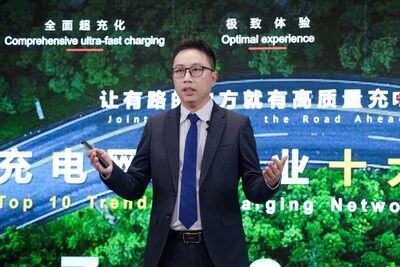
Huawei's Vision for Charging Infrastructure: Key Trends for 2025
The Future of Charging: Huawei's Insights for 2025
In a recent announcement, Huawei disclosed ten significant trends that are poised to transform the charging infrastructure landscape by 2025. With the insightful commentary from Wang Zhiwu, the president of Huawei's Smart Charging Network Division, the company is setting the stage for advancements in electric vehicle (EV) charging technology. The transition towards a more electrified and connected future is already underway, and Huawei is committed to driving this change.
1. High-Quality Development
The first trend emphasizes the need for high-quality development in charging networks. As the industry evolves, a shift from quantity to quality is essential. This will technically revolutionize the landscape, with key players needing to innovate rapidly to keep pace. The focus will be on ensuring that charging solutions align with higher standards of performance and reliability.
2. Complex Ultra-Fast Charging
‘Ultra-fast charging’ is set to become a defining term in 2024. Urban areas in China are already adopting ultra-fast charging stations, significantly expanding the EV model availability. By 2028, it's anticipated that all mainstream electric vehicle models will support ultra-fast charging across various scenarios, enhancing convenience for users and improving the overall charging experience.
3. Optimal User Experience
The integration of advanced technologies is transforming the charging experience into a more digital, intelligent, and automated process. From smartphone connectivity to real-time updates, the aim is to create a seamless and user-friendly charging environment, marking the onset of a digital era in EV charging.
4. Electrified Logistics
The transition from diesel to electric-powered heavy-duty vehicles hinges on effective charging solutions. Ultra-fast charging technologies will help overcome existing barriers, enabling logistics companies to adopt electric fleets more readily. Benefits like reduced infrastructure costs and compatibility with various vehicle types will facilitate this transition.
5. Network Compatibility
Looking ahead, the interaction between charging stations and the electrical grid will become more dynamic. Shifting from passive to active responses ensures network reliability, enhancing safety and efficiency in the electricity supply chain. Future technologies will support two-way communication, benefiting both users and providers alike.
6. Multi-Level Power Aggregation
With a growing range of compatible EV models, multi-level power aggregation will support megawatt-level charges for commercial vehicles. As requirements evolve, transitioning from basic sharing technologies to more sophisticated power aggregation methods will optimize energy distribution and usage.
7. Liquid-Cooled Charging Technology
With diverse charging scenarios, including extreme environments, the industry is rapidly implementing high-performance liquid-cooled charging equipment. This approach combines liquid-cooled power units with charging stands to optimize performance and efficiency in various temperature conditions.
8. Intelligent Integration of PV, SSE, and Chargers
The traditional configuration of solar power, storage, and charging units will evolve into intelligent integration systems. This innovation promises to enhance lifecycle benefits while being considerate of electrical grid demands, ultimately ensuring a safe charging environment.
9. Low-Power DC Charging
Future advancements in vehicle-to-grid (V2G) technologies will spotlight low-power DC charging in public and residential areas. This trend will introduce enhanced digital functionalities for users, such as centralized management and rewards systems, all while fostering the growth of V2G capabilities.
10. Electric Safety Standards
As charging stations proliferate in densely populated areas, the emphasis on electrical safety will shift from single-point assessments to comprehensive safety measures across all interacting components—people, EVs, charging stations, and grid systems.
Through these ten trends, Huawei is actively working to propel the evolution of the charging infrastructure and redefine the future experience of electric vehicle ownership. The journey towards a more electrified and efficient ecosystem is well underway, with the expectation of substantial growth in the number of EVs over the next decade, projected to reach an impressive 480 million globally. With this commitment, Huawei is gearing up to meet the upcoming challenges in charging technology, ensuring a smoother path forward for users everywhere.

This initiative underlines Huawei's pledge to collaborate with partners and customers as they enhance ultra-fast charging capabilities across multiple scenarios, ensuring that the vision for a battery-powered future becomes a reality.
Topics Consumer Technology)










【About Using Articles】
You can freely use the title and article content by linking to the page where the article is posted.
※ Images cannot be used.
【About Links】
Links are free to use.